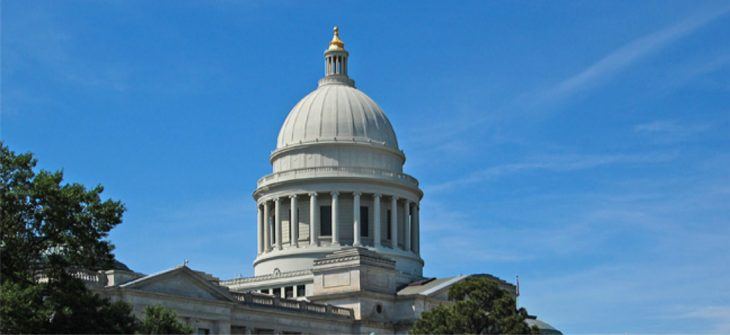Bill allowing nitrogen gas for executions forwarded by House Judiciary
by February 27, 2025 2:34 pm 579 views

A bill allowing for nitrogen hypoxia to be used as a criminal execution method for the Arkansas Department of Corrections passed the Arkansas House Judiciary Committee on Thursday (Feb. 27) and will now head to a full House vote.
Rep. Jeff Wardlaw, R-Hermitage, who is the lead sponsor of HB 1489, told committee members this method cost the state less money and it’s readily available. He said it’s a “quick and humane death,” though it’s only been used four times in Alabama since the beginning of last year.
Deputy Solicitor General Dylan Jacobs said the state has not been able to get the legal cocktail of drugs used in lethal injection since 2017. Death penalty opponents have pressured pharmaceutical companies to not provide the drugs needed for lethal injections in several states, Jacobs said.
“They’ve done their level best to make sure Arkansas can’t buy those drugs,” Jacobs said.
Arkansas has 25 prisoners on death row. They are all men.
Several committee members and witnesses pushed back on the bill, noting the American Veterinary Association has recommended mammals not be euthanized with this method because it’s cruel, and several states have banned it from being used on animals.
Rep. Tippi McCullough, D-Little Rock, said the procedure seems to be experimental, and only Alabama has used it. Mississippi and Louisiana have passed legislation to allow for the method, while Oklahoma and Missouri are considering it, Jacobs said.
In Alabama, a mask is placed on the inmate and nitrogen gas is pumped into the mask rendering the person unconscious. The inmate suffocates due to a lack of oxygen. The first person to be put to death using this method was Kenny Smith, who was convicted of killing a pastor’s wife in 1988. In 2022, he reportedly survived a botched lethal injection.
His spiritual adviser, Rev. Jeff Hood, was in the death chamber with Smith when he was executed. Hood told committee members one of the first things he had to do was sign a waiver releasing the state of Alabama of any liability if he was poisoned or killed by leaked nitrogen in the room.
Hood said Smith heaved back and forth for up to 10 minutes, and the front of the mask was covered in his bodily fluids. At one point witnesses, including victim family members, screamed at corrections officials to stop. Afterward, the victim’s family released a statement saying the state lied to them, and it was not a humane method.
Hood, who has served as a spiritual adviser for nine executions, said in emotional terms it was the single worst one he’s ever witnessed.
“This is about torture,” he said. “Nitrogen hypoxia is torture. … It’s the most horrific thing I’ve ever seen.”
Wardlaw countered that this was the hardest bill for him to sponsor in the 14 years he’s been in the Legislature, and he doesn’t think he’ll ever sponsor one any harder. But the death penalty is supported by an overwhelming number of Republicans and even a third of Democrats, and it’s the law in Arkansas, he said.
If the bill advances, there may be other challenges. Several witnesses who testified said the method might not survive court challenges. Specifically, it might violate the U.S. Constitution’s Eighth Amendment, which doesn’t allow for cruel and unusual punishments.
The bill doesn’t require the nitrogen to be medical grade, and that could be on purpose, said Rep. Andrew Collins, D-Little Rock. The three largest nitrogen gas producers have stated they will not sell their products to be used in executions, Collins said.
Another potential legal problems with the bill could be the person or entity making the decision as to what execution method will be used, said Rep. Ashley Hudson, D-Little Rock. The bill would allow for the Arkansas Department of Corrections to decide what method is used, and decisions and actions relating to an execution are often not made in public.
“Where is our oversight?” she said.
